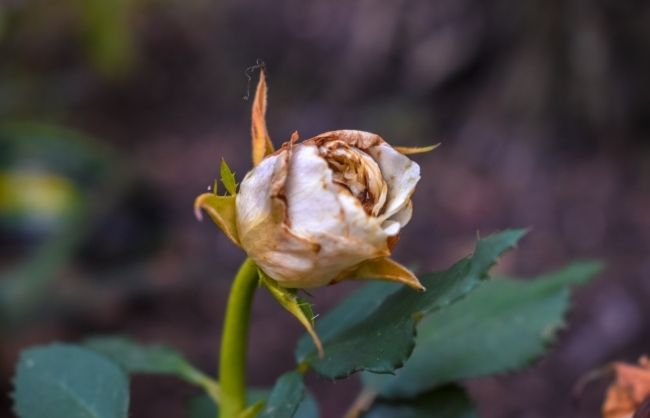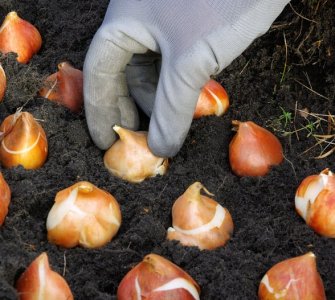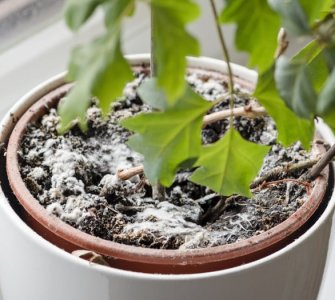Ok people, we have a rose garden emergency situation right now if you’re manically googling ‘I accidentally sprayed my roses with weed killer, now what?’
So let me guess – there were about a million and one weeds growing around your prized rose bush. You took one look at it, decided there is nooooo wayyyyy that you’re getting down on your knees and plucking and cleaning that for the better part of the Saturday afternoon.
So you quickly took hold of some organic (or commercial) weed killer and got down and dirty. But – you didn’t account for the wind. Or, your dog ran past and you got sidetracked. Or – and it can’t be worse than this – you relegated the cleaning job to someone else, and they didn’t even think the rose might not like the weed killer, spraying it indiscriminately! And just about now, you’re Googling, in full panic, “I Accidentally Sprayed My Roses with Weed Killer. NOW WHAT?”
Depending on the time that has passed and damage intensity, your rose has a chance to be saved. Organic weed killers will always be easier to remove than inorganic weed killers. They are often much less vicious towards foliage. Water your rose copiously, as soon as possible. Drench your plant completely. The soil needs to be completely saturated, until you see water bubbling on top. If the watering doesn’t seem to help and you see dieback, or parts of your rose changing color, frequently brown and / or yellow, cut away affected parts, as that should curb further poisoning. However, there is a likelihood your rose won’t make it no matter what you do, as weed killers can be particularly potent.
Table of Contents
What do I do first if I accidentally sprayed my roses with weed killer?
Identify The Type Of Weedkiller
Know that there is a considerable difference between whether the weed killer in question is organic or inorganic.
Inorganic weed killer is very strong. Oftentimes, the chemicals work viciously. Once the weed killer penetrates the soil, it usually works roots first. Plant roots uptake the weed killer molecules, rapidly dying, sometimes in a matter of days. Unfortunately, if this is the type of weed killer you used, it is very likely you will not be able to save your rose. Whenever rot goes root first, the plant has little to no chance to rejuvenate.
In case of organic weed killers, the agents used are generally more gentle. At the very least, they tend to take a longer time to work – giving you time to salvage a rose that might be affected.
Water thoroughly
No matter which type of a weed killer, you should first grab the nearest garden hose. Everywhere the weed killer even slightly grazed the rose plant needs to be washed with copious amounts of water.
Use a gentle stream of water and wash leaves, foliage and stems. Make sure that the soil is thoroughly saturated. Generally, roses are not a fan of saturated, sopping-wet soils. However, in this extraordinary condition, regular rules do not apply. Water the soil until you see water coming out at the top, or at least you notice bubbling at the surface. This indicates the soil is fully saturated – meaning that it has been washed through. The water will carry away any traces of weed killer.
You should not skip this step. Failing to wash out a full perimeter of soil under and around your rose might result in the rose dying no matter what you do. Furthermore, it can cause your other plants to wilt as well, as weed killer is notoriously sneaky and able to linger in soils for longer than you would like.
Assess the damage
After a thorough watering, give your rose plant a few days to recuperate. During this time, closely monitor how it is doing.
Generally, weed killer effects leave some trace on a rose plant. Gardeners usually call these symptoms a “weed killer burn”.
While checking your rose plant carefully, look for any of these signs:
- burned appearance
- brown spots
- rapidly yellowing foliage
- leaves beginning to cup
- distorted/twisted canes
- a swelling in lateral canes
Help Your Rose Recover From Accidentally Spraying Roses With Weed Killer!
Prune your rose
The go-to solution when nothing else works. If you notice the damage I described above, the best bet is to cut it before it starts spreading. Any abnormal, deformed or rapidly declining shoots and canes need to go STAT.
In most extreme cases, if you see black shoots, you will need to drastically prune your rose back. If the dieback is serious, don’t hesitate. The rose will take a while to grow back out, but it will at least manage to live to see another season.
Feed and mulch your rose
As soon as the rose starts exhibiting sings, make sure to feed it a balanced organic fertiliser. While this might not save the rose, it gives it a fighting chance. Feeding the rose will make it stronger and willing to make strong new canes and growths. This might just be enough to have it pull out and recover from burns and bruises.
In addition to feeding, mulch your rose. Rake the topsoil, and if possible, consider completely replacing it. If your rose is not too big or too rooted, consider repotting it into uncontaminated soil.
How can I prevent weed killer damage in the future?
- Use your weed killer as described on the product label. However, if possible, use natural, organic weed killer. It is usually slow-acting. In case of any oopsies, it will give you the necessary time to simply rinse your rose plant thoroughly, leaving no damage to foliage, stems or even roots.
- If you are a sustainable gardener and you have the habit of rinsing and reusing any sprayers or cans, give them a bath! After using chemicals in your sprayer, dunk it in a soap and water bath for a few hours. This is a good way to make sure you’re not also reusing residual chemicals from your gardening ventures!
- Avoid walking over the area where you used weed killer. You can easily spread the poison around your garden on your soles, while remaining blissfully unaware.
- When applying the weed killer, take extra care to ensure protection of nearby roses and other plants. It is best to simply cover them with a plastic sheet, screen, or a board. Once the spray had dried on those pesky weeds, it is safe to remove the protection.
- Spray weed killer when it is not windy to avoid accidents.
Warnings in case you sprayed your roses with weed killer
No matter what you do, your rose might die because of weed killer effects. Sometimes, the concoction is simply too strong, or the concentration is too large, and nothing will save it.
In case that happens and you decide to drown your sorrows by planting a fresh new rose, you might want to wait up a bit with that. For a month or so to come, water the affected patch of soil. Oversaturate it with water and let it drain from toxins. Do not immediately plant a new rose! The soil conditions will kill your young and fresh rose just as fast. Quite simply, soils have the annoying habit to retain everything that goes in them and to remember how they were treated for a long time.
If your rose manages to pull out of this life-or-death affair, congratulations! Kiss it extra for us, but remember NOT to eat any parts of it! This includes rose hips, leaves, petals – EVERYTHING. Do not use it for tea, do not eat it, keep it in your garden as a pure decoration. Weed killer likely slightly contaminated your rose with unwanted chemicals to some degree. Give it a year or so of organic gardening care to recover from this ordeal, at which point you can start using it for various homemade remedies again! Rose petal tea, anyone?
I didn’t spray my rose with weed killer, but it exhibits weed killer poisoning symptoms
Occasionally, weed killer damage might occur and your rose might be affected without you even knowing. You’re absolutely sure you didn’t apply any by accident but your plant still seems to be suffering.
Well, weed killer poisoning doesn’t have to be a result of a moment of carelessness. Possibly, during windier conditions, the currents simply carried weed killer particles to your rose plant.
It is also not impossible that you reused a watering can that once housed weed killer, or that residual weed killer seeped through the soil and found its way to be uptaken by your roses. This is not as unusual as you might think, given that roses develop far-spreading roots designed to uptake everything they can from the soil they’re in.
That’s it – and I so dearly hope your rose makes it! Do you have any tips or tricks to share that you learned through your gardening mishaps? Do you know additional tricks as to what to do if you sprayed your roses with weed killer? Let me know – I’m all ears!




